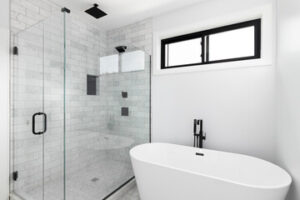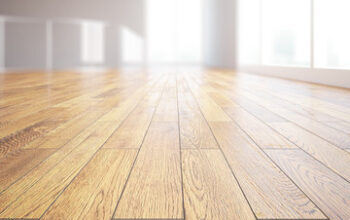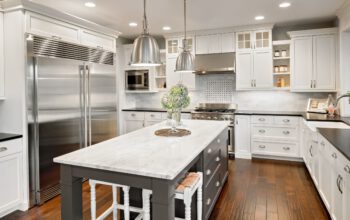Look for a professional who offers a wide variety of products and services. A reputable company will be willing to work with you to determine what size and type of glass you need for your specific project. Clear float glass is commonly used to protect furniture (desks, nightstands, coffee tables). Polished edges are available for safety and aesthetic flair.

Custom Glass Atlanta is designed and fabricated to meet a project’s specific requirements. These requirements vary from custom dimensions and shapes to specialized finishes and decorative elements. Whether it’s a sleek glass table top or a sophisticated shower enclosure, customized glass adds elegance and sophistication to any space while providing an array of benefits to homeowners and businesses alike.
The design process begins with a consultation between the glass manufacturer and client. The client discusses their vision, requirements, and preferences with the glass manufacturer, and may also provide sketches or digital renderings to help visualize the finished product. The glass manufacturer will then use the information gathered during this phase to create an accurate glass fabrication estimate.
After the initial design and material selection process, the artisan will carefully cut the glass to size using precision tools and techniques. If desired, additional customization can be achieved through etching, engraving, coating, or other processes. Once all the pieces have been prepared, they can be assembled and installed to complete the piece of furniture.
When choosing a glass company to work with on your custom furniture, be sure to choose one with experience and a proven track record. A qualified and trustworthy glass professional will be able to review your ideas, make up drawings, and refine the final design with you. This is an important step in the process to ensure that your vision is correctly detailed and executed.
If you’re not sure where to start, a good place to begin is by browsing online for inspiration. Find images of glass pieces that catch your eye, and take note of the details that appeal to you. This will give you a good idea of what type of glass you want for your new furniture, and what kind of aesthetic you’re going for.
Curved glass is a popular choice for many furniture applications because it adds a sense of elegance and sophistication. However, it’s important to keep in mind that curved glass does require special considerations. For example, curved glass can be more susceptible to optical distortion, and it’s also not recommended for locations that are exposed to direct sunlight or other sources of heat. The bending process also results in a higher degree of stress, so it’s important to have a well-established relationship with your glass fabricator to ensure the final product is high-quality and structurally sound.
Measurement
In order to make a glass top, window or door panel that meets your specifications, it is vital to have the correct measurements. Having the right measurements will ensure that your custom curved glass is made to the exact dimensions needed. This can be tricky for people who are unfamiliar with measuring curved glass, but it is important to know what the process entails.
When measuring a curved piece of glass, you will need to take three separate measurements: the depth, the angle and the chord. The depth is the distance from the bottom of the curve to the highest point of it. The angle is the number of degrees that the curve has, and the chord is the distance between any two points on the curve.
Using a metal ruler against a flat surface is the best way to measure curved glass because it will allow for maximum accuracy. If you try to eyeball the measurement with a straight ruler or use a flexible tape, you may end up with an inaccurate result.
Another important factor in measuring a curved piece of glass is to take into account any special requirements that your project might have. If you need to have the glass cut to accommodate an electrical outlet, for example, you will need to specify this when making your measurements. Also, you will need to account for any bends or flex in the glass to ensure that your finished product is as functional and attractive as possible.
Your Image Glass New Jersey glazier will keep updated on local and Universal Building Codes that must be adhered to for commercial installations, such as the reason why tempered safety glass is required in certain areas of a building. This will be a huge help in ensuring that your installation is completed on time and within budget.
This website contains forward-looking statements within the meaning of Section 27A of the Securities Act of 1933 and Section 21E of the Securities Exchange Act of 1934. These statements are based on current expectations and speak only as of the date they are written. The company does not assume any obligation to update any such forward-looking statement.
Fabrication
During the glass fabrication process, the raw material is transformed into functional and aesthetically pleasing products for a variety of uses. This is accomplished through a series of processes including cutting, grinding, drilling, polishing, tempering, and finishing. Each offers unique advantages; cutting allows customization and reduces waste, grinding smoothes the edges of a sheet, drilling creates holes without cracking or fracturing, and polishing enhances transparency and adds a high-quality finish.
Depending on the type of glass required, additional fabrication techniques may also be employed, such as engraving, acid etching, satin etching, and lamination (the use of multiple, bonded layers to make a stronger, more durable sheet). Advanced fabricators are even capable of performing UV bonding, which utilizes an ultraviolet light-sensitive adhesive.
As a general rule, custom glass can be made to fit almost any size or shape necessary for a particular project. A common example is a staircase railing that requires special glass panels to accommodate various stair angles. Alternatively, glass can be made to replace old glass or mirrors that have been damaged over time.
Curved glass is often required in certain applications, such as specialized windows and automotive windshields. This type of glass must be carefully shaped and tempered to ensure that it can withstand the stresses of daily life, while still providing strength and safety.
For curved glass, precise dimensions are usually required, in addition to the length and width of the product. These dimensions can be measured using a flexible tape measure and a mylar or hardboard template. In some cases, a radius dimension is required; in this case, the dimensions can be obtained by measuring from the center of one end to the other. Once the dimensions are known, the corresponding radius mold is created to help shape and anneal the glass. This step is vital for ensuring the quality and durability of the finished product.
Installation
If you want to install glass in your home or business that is not standard sized, our professionals can provide you with the best solutions. We can create custom sizes, thicknesses and more. Our trained and professional installers will ensure that the installation process is efficient and complete.
Glass thickness can define the way your glass looks and feels, as well as the applications for which it will be used. Choosing the right glass for your project can save you time and money in the long run. For example, 1/4 inch thick clear float glass is used to protect the surface of furniture – desk tops, dressers, nightstands, coffee tables and more. It can also be installed on walls and doors as a decorative alternative to traditional frames or a door insert.
3/8 inch thick clear glass is the most common type of window glass and is often referred to as “double strength.” It is more durable than float glass and is less likely to shatter when broken. This type of glass is commonly used in commercial settings and on larger table tops, shelves, and framed shower doors. Its cost is slightly higher than 3/32 inch glass, typically running about $5-7 per square foot, depending on customizations and edge cuts.
1/8 inch thick laminated glass is a highly durable glass that is manufactured by “sandwiching” a polyvinyl butyral (PVB) transparent interlayer between two glass panes during the manufacturing process. This design prevents the glass from breaking into dangerous shards that could injure people and damage property. Laminated glass is used in multiple industries to keep vehicle drivers and occupants safe from debris from crashes.



